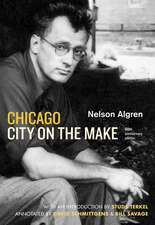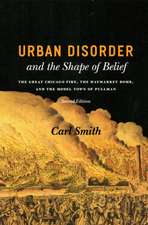Ready-Made Democracy: A History of Men's Dress in the American Republic, 1760-1860
Autor Michael Zakimen Limba Engleză Paperback – 30 ian 2006
Ready-Made Democracy explores the history of men's dress in America to consider how capitalism and democracy emerged at the center of social life during the century between the Revolution and the Civil War. The story begins with the elevation of homespun clothing to a political ideology on the eve of Independence. Homespun clothing tied the productive efforts of the household to those of the nation, becoming a most tangible expression of the citizen's attachment to the public's happiness.
Coarse dress did not long remain in the wardrobe, particularly not among those political classes who talked most about it. Nevertheless, exhortations of industry and simplicity became a fixture of American discourse over the following century of industrial revolution, as the mass-produced suit emerged as a badge of a uniquely virtuous American polity. It is here, Zakim argues, in the evolution of homespun into its ready-made opposite, that men's dress proves to be both material and metaphor for the rise of democratic capitalism—and a site of the new social arrangements of bourgeois life.
In thus illuminating the critical links among culture, ideology, political economy, and fashion in antebellum America, Ready-Made Democracy will be essential to anyone interested in the history of the United States and the construction of modern life.
Coarse dress did not long remain in the wardrobe, particularly not among those political classes who talked most about it. Nevertheless, exhortations of industry and simplicity became a fixture of American discourse over the following century of industrial revolution, as the mass-produced suit emerged as a badge of a uniquely virtuous American polity. It is here, Zakim argues, in the evolution of homespun into its ready-made opposite, that men's dress proves to be both material and metaphor for the rise of democratic capitalism—and a site of the new social arrangements of bourgeois life.
In thus illuminating the critical links among culture, ideology, political economy, and fashion in antebellum America, Ready-Made Democracy will be essential to anyone interested in the history of the United States and the construction of modern life.
Preț: 318.48 lei
Nou
Puncte Express: 478
Preț estimativ în valută:
60.95€ • 62.96$ • 50.72£
60.95€ • 62.96$ • 50.72£
Carte tipărită la comandă
Livrare economică 25 martie-08 aprilie
Preluare comenzi: 021 569.72.76
Specificații
ISBN-13: 9780226977959
ISBN-10: 0226977951
Pagini: 306
Ilustrații: 36 halftones, 1 map
Dimensiuni: 152 x 229 x 20 mm
Greutate: 0.43 kg
Editura: University of Chicago Press
Colecția University of Chicago Press
ISBN-10: 0226977951
Pagini: 306
Ilustrații: 36 halftones, 1 map
Dimensiuni: 152 x 229 x 20 mm
Greutate: 0.43 kg
Editura: University of Chicago Press
Colecția University of Chicago Press
Notă biografică
Michael Zakim teaches history at Tel Aviv University.
Cuprins
Acknowledgments
Introduction: Sartorial Politics
1. A Homespun Ideology
2. A Clothing Business
3. The Reinvention of Tailoring
4. Dressing for Work
5. Ready-Made Labor
6. The Seamstress
7. A Fashion Regime
Conclusion
Notes
Index
Introduction: Sartorial Politics
1. A Homespun Ideology
2. A Clothing Business
3. The Reinvention of Tailoring
4. Dressing for Work
5. Ready-Made Labor
6. The Seamstress
7. A Fashion Regime
Conclusion
Notes
Index
Recenzii
"[Zakim] suggests that too much emphasis on America's preliberal past has diverted attention from the Big Story: the 'great transformation' of the United States into a democratic capitalist society in the early nineteenth century. It is this Big Story that Zakim seeks to illuminate in Ready-Made Democracy. He succeeds brilliantly. . . . Part of what makes Ready-Made Democracy so worth reading is Zakim's beautiful, even elegant, prose. At least as important is his ability to marry Marxian analysis and Tocquevillian insights into a coherent and compelling interpretation of American history."
“This dazzling book deserves a wide audience of readers, not least among labor historians. Do not let the narrow-seeming subtitle fool you; saying that Ready-Made Democracy is about “men’s dress” is like saying that Moby Dick is about a whale. Zakim uses the production, marketing, and consumption of clothing—a fascinating and important story that he tells with verve and precision—as a lens through which to reframe and synthesize the first century of democracy and capitalism in the United States. This genre-bending work is simultaneously splendid cultural history, sure-handed business history, fascinating labor history, and, ultimately, an important political history, for it demonstrates the ways in which clothing became, in the mid-nineteenth century, a ‘paradigm of liberal governance’. . . . A brief summary can not do justice to the empirical richness or the surprising but enlightening juxtapositions and insights that mark almost every page of the book. . . . Ready-Made Democracy marks a signal contribution to American historiography.”
“Zakim follows the development of the market for ready-made clothes from innovations in business and manufacturing through the emergence of an urban retail culture serving ‘white-collar’ clerks to the conditions of seamstresses and, finally, to the standardization of a sartorial icon for bourgeois individualism—the broadcloth suit. He thus offers an impressively nuanced social history of a modern commodity, one that describes in remarkable detail production and retail practices that often remain invisible in studies of the nineteenth-century city. . . . Situated against long-standing debates about the rise of capitalism and the liberal consensus that defined antebellum America, Ready-Made Democracy offers an innovative model of cultural history. It interprets broad themes about the legacy of the republican ideology of “homespun” within a startlingly vivid evocation of the material world of everyday life while keeping our eyes on the big picture of structural changes in society and economy that effected a sometimes tense accommodation of mass industry and democratization. More impressive than the archive Zakim has assembled is the sophisticated interpretation and elegant narration by which he dramatizes his argument. To understand why "getting dressed proves to be a central event in modern life," he notes, requires a method that locates the existence of the suit within a complex interplay of "habits, systems, conflicts, and explanations that were born in the wake of the commodity's rise to social dominance" (p. 4). Throughout, Zakim's reading of his sources remains pungently alive to the particular artifacts, terms, and phrases by which the market entered the very fabric of work, shopping, and deportment.”
“A brief review cannot do justice to the complexity of Zakim’s argument or to the multifaceted nature of his book, which literally bursts its seams. . . . In short, Zakim combines a careful, perceptive, often original discussion of the evolution of the clothing industry—one that encompasses entrepreneurs, workers, and consumers—with a broader cultural history.”
"Zakim rescues the subjects of business, fashion, and the commodity from the dustbin of political history. He offers an insightful addition to the history of the men's clothing industry in America and shifts its importance to center stage. In many ways, his book provides clues to the origins of American consumer culture."
"This is a creative book, full of original and often brilliantly expressed insights. . . . [Zakim's] central points about the relationship between fashion, democracy, and the culture of capitalism in nineteenth century America is plausible and important."
"A valuable, inventive, and multifaceted examination of important dimensions in the early economic and political development of the United States."
“Original, vivid, and provocative, Zakim’s study of male dress is rich with new insights into the significance of capitalist development for antebellum American culture.”<Amy Dru Stanley, University of Chicago
“A delightful book, one full of fresh insight into the relationship between two critical developments in nineteenth-century America: the emergence of political democracy and industrialization. From sartorial politics to burgeoning consumerism, little escapes Zakim’s fine eye and elegant pen. Ready-Made Democracy is Saville-Row scholarship.”<Mark Smith, University of South Carolina
“In vigorously analyzing the economy of clothing in New York City in the decades before the Civil War, Zakim transcends older debates on the twin emergence of capitalism and democracy, contributes to the ongoing project of dismantling a romanticized view of American labor history, and reinvigorates the writing on American capitalism by deeply situating business in a political and social context. Powerfully argued and splendidly told, this book marks a milestone in American history.”<Sven Beckert, Harvard University
“A marvelous work of history, imaginatively conceived, scrupulously researched, and gracefully composed. Zakim takes us behind the scenes of the antebellum commercial revolution, inside the offices of clerks and counter-jumpers and the shabby rooms of young seamstresses. There he shows us the makings of the new, mass-produced uniform of the business suit: the principal term in a new language of goods that promised to finesse the tensions between standardization and individuality and between capitalism and democracy. With his unerring eye for the revelatory detail, Zakim pulls apart the stitches in the otherwise seamless story of the early nation’s ‘market revolution’ and shows how Americans were prepared for a new and distinctly masculine consumerism—how they were made ready, in other words, for the ready-made.”<Jean-Christophe Agnew, Yale University
"This is a very ambitious book that not only fulfills all the reader's expectations, but also offers a feast of ideas that historians of dress will have to note carefully in future."










